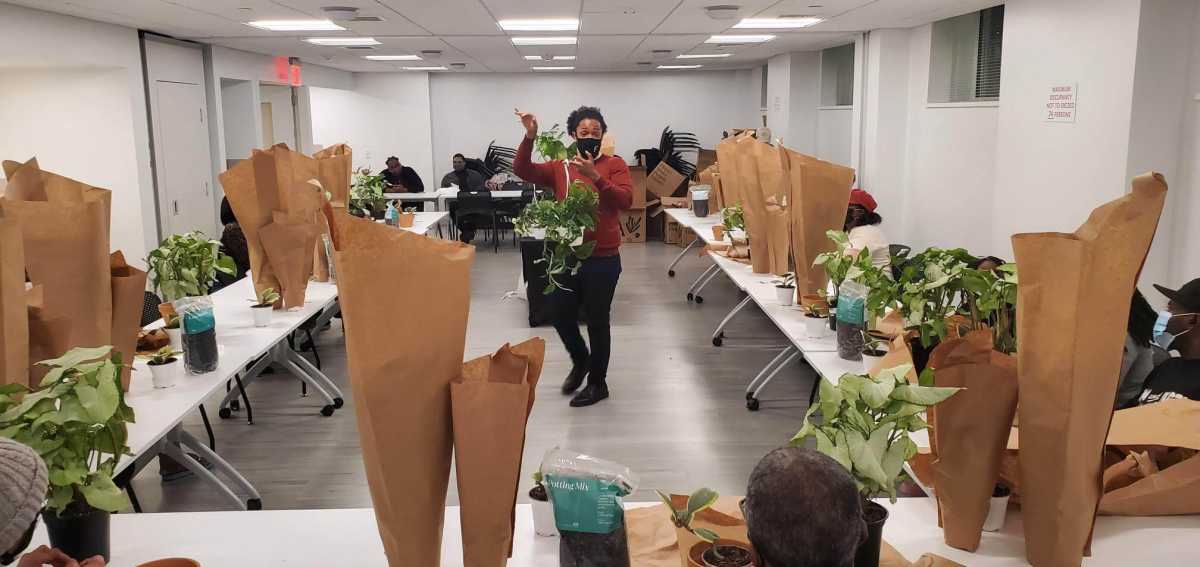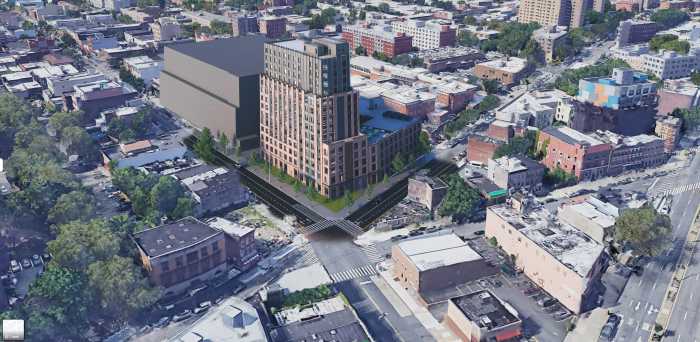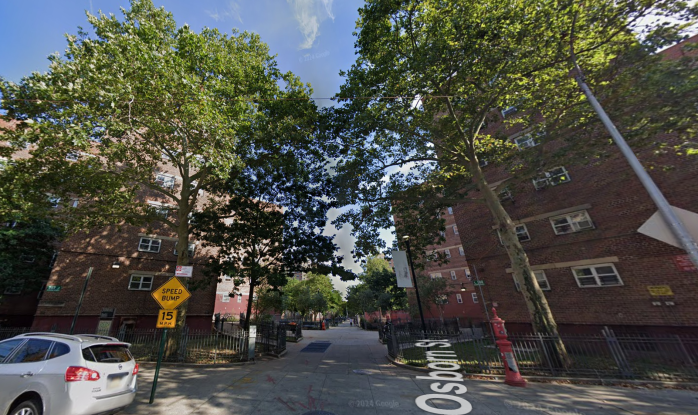Robert Jeffery, better known as Planter Rob, has his own unique way of advocating for affordable housing — and it involves house plants.
Late last month, Planter Rob partnered with house plant delivery site The Sill to donate almost 200 house plants to Edwin’s Place residents in Brownsville, and to host a plant-care workshop and Q&A at the complex, which consists of 126 apartments for homeless and low-income individuals, veterans, and families, according to homeless outreach organization Breaking Ground.
The flora aficionado originally intended to use his plant workshops as a platform to foster important conversation about racism and social justice, but is now looking to use them to help foster affordable housing opportunities across the five boroughs.
“I realized a lot of people in our community, a lot of plant enthusiasts, tend to shy away from having those tough conversations about racism, and I wanted to make those conversations less taboo for us,” Planter Rob told Brooklyn Paper. “But I realized that I could be doing more with that and … doing something that was tangible, like actually bringing people indoors as well as plants.”
A graduate of Western Michigan University, Planter Rob said he was always “the plant guy,” gifting greenery to friends and roommates. But after graduation, Planter Rob had the choose between living with his parents in Alabama, or “couch surfing” until he could “get on his feet.” He chose the latter.
“It was really tough having to make ends meet,” he said. “I remember having to give plasma just to try to make rent so I could pay for my friends to house me and feed me for a bit.”
Now 34, Planter Rob is living in New York, engaged, and a dad to 80 house plants. Wanting to “advocate for others” in situations he experienced, he set up a way to give back.
Through Planter Rob’s “Welcome-Home Plants” program, people can choose to gift a houseplant — and access to one of his workshops — to a permanent resident associated with Breaking Ground, with the ultimate goal of helping people establish homes where they might not feel that they have one. Beyond that, he hopes his workshops will inspire others to advocate for better housing opportunities across the Big Apple.
Planter Rob remembers how buying a plant for his first home made him feel “empowered,” and “as if things were going to get better.” He also said having something to nurture acted as a type of personal therapy.
Beyond personal growth, Planter Rob said having house plants introduced him into an “amazing community” of fellow plant lovers, something he wants to give back to those experiencing homelessness.
At Edwin’s Place in February, Planter Rob observed firsthand the connection house plants could make.
“It was amazing how many residents would come up to me and just want to show me their plant,” he said. “They would go upstairs and bring their plant down to me. And you would see different residents come up and just start an interaction [with each other], they’d just start talking about a plant, and that’s probably something that would not have normally happened.”
In the past, gardening has primarily been an “exclusive club,” Planter Rob said, adding that most people “don’t have the income to spend on something that might die within a week.”
“Having the income to spend on plants is definitely something that lower-income communities are not awarded, and those communities tend to be Black and brown communities,” he said. “I want [house plants] to be more accessible to people that look like me, people that look like my mother, that look like my sister, my brothers.”
A long-term goal of Planter Rob’s is to have politicians look to his “plant followers” to sign petitions and change policies. He said this would show he has created “a community of plant lovers that are actually advocating for affordable housing.”
But between advocating for social change and teaching planting basics, Planter Rob said attitude is key. “I always want to be taking up space in a joyous way because we don’t see enough of that,” he said.
But he’s not the only one using greenery to inspire change. His partner for the project, Eliza Blank, founded The Sill when she was 26 years old. Seeing Planter Rob on social media and wanting to take part, The Sill provided the plants for Edwin’s Place, and hopes to collaborate with Planter Rob again in the near future.
Blank — whose mother emigrated to the US from the Philippines at age 23, and whose grandfather has Jewish roots in Bensonhurst — said Planter Rob is filling a need of introducing gardening “to a broader audience.”
“Even when I started The Sill, it did feel like gardening in general was very elitist and exclusive,” Blank said. “We all looked up to like Martha Stewart, but that’s not really a figurehead for us. So who are we actually going to learn from, where you can ask really basic questions and not feel inadequate because you killed your succulent?”
Being a young entrepreneur herself, Blank wants to see more representation in both the plant and business world. Just as her mother’s journey inspired her own work ethic growing up, Blank hopes to do the same for her daughter — and like Planter Rob, she believes plants are a way of creating unexpected opportunities and building connections.
“I think there’s so much more that plants can do than they’ve done in the past,” she said.
























